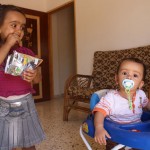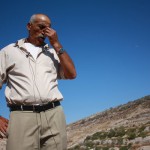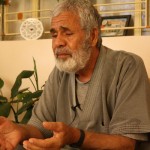
“You drive the car. I know you miss driving,†said Fr. Firas while driving me home from a visit to the Jenin refugee camp, a few miles from his church in Zababdeh, West Bank.
“But I don’t know how to drive stick!â€Â I cried, knowing that in a few minutes I would be behind the wheel.
“You’ll learn in Palestine!â€Â He laughed, and I soon found myself on a nearly empty road, short legs struggling to reach the clutch in his old, white station wagon.
Fr. Firas wants me to “get my hands dirty†in his town. Each Sunday, he tells stories about his life, introduces me to congregation members, includes me in Sunday lunch with his family and takes me on trips to important local sites, like the refugee camp in Jenin, still torn with bullet holes from the second intifada.
Fr. Firas has “many hopes†for the connection between his congregation, St. George Melkite Church, and congregations in other countries.    Fr. Firas recalled an Aramaic word in the Beatitudes, “tubayhoun,†which he translates into: to work, or to make a change. He says it’s an active phrase, telling you to do something for the poor, the prisoners and the ignored. “We need you to tubayhoun, or to change the daily situation of Palestine in the occupation,†he said.
Fr. Firas faced an enormous hurdle when he began as the priest at St. George eight years ago. The church hadn’t had a priest in 18 years, the parsonage and church were in physical ruins and the community felt abandoned. Fr. Firas rubbed his hands together and got to work.
He started rebuilding the church with cement and paint, and soon the doors were opened. Four people attended his very first church service in Zababdeh, all of whom were his family.  He persevered and started programs that included the entire community of Zababdeh.
One of his programs currently sponsors 50 students to attend a local school that provides a strong education. $500 pays for the student’s books, clothing, school fees and sports for one year. Fr. Firas hopes the sponsorship program will build the kids’ future, open their minds and teach them about acceptance.
Fr. Firas started an olive oil soap program to support local olive farmers who do not receive a fair price from Israelis for their product and to provide work for locals. He pays a fair price for the olive oil and provides it to local women to make into soap, which he sells for $3 per bar. Due to the cost of buying the olive oil and the packaging, paying the workers and shipping the soap, he only makes $1 per bar. The profit from the olive oil soap program typically supports the student sponsorship program.
He also has a sewing project for women in Zababdeh, Jenin and Raba. The sewing project provides work for 13 women, both Christians and Muslims. “Inshallah we can bring in Jewish people as well,†Fr. Firas said. The women work from 7am-3pm, but they can leave whenever they need to if they have children or prefer to work part-time.
His newest program is a kindergarten, opened on September 24, 2010. He hired two teachers and there are 10 students currently enrolled. Fr. Firas hopes more students will sign-up and dreams of opening an elementary school next. This program provides day care as well as the opportunity for young graduates to work if they haven’t yet found a job.
Fr. Firas said that he’s checking items off his list of dreams: becoming a priest, rebuilding the church in Zababdeh, starting a kindergarten, etc. His congregation now has 200 members. He encourages people to come to Zababdeh to see the relics and stones, but more importantly, to meet the living stones in his community.
To watch short video clips and read more about the residents of Zababdeh go to: Salt Films.
Visit the St. George Church website.
Watch a short video introducing Fr. Firas and his programs at St. George.

